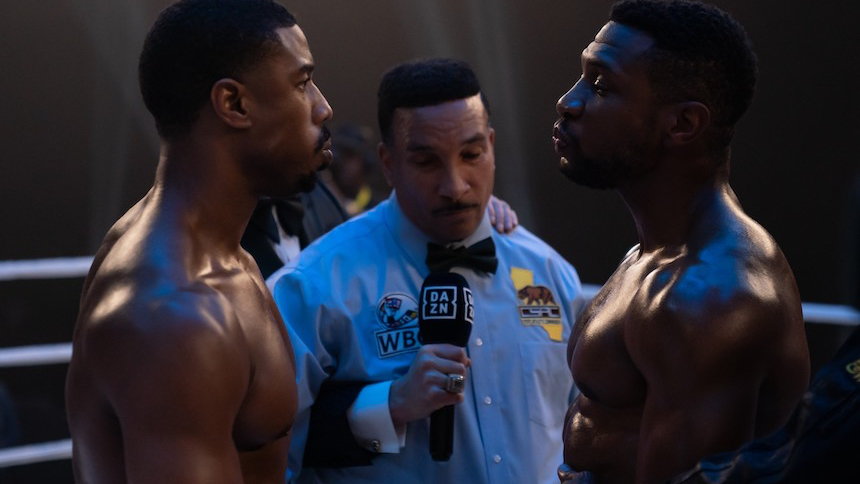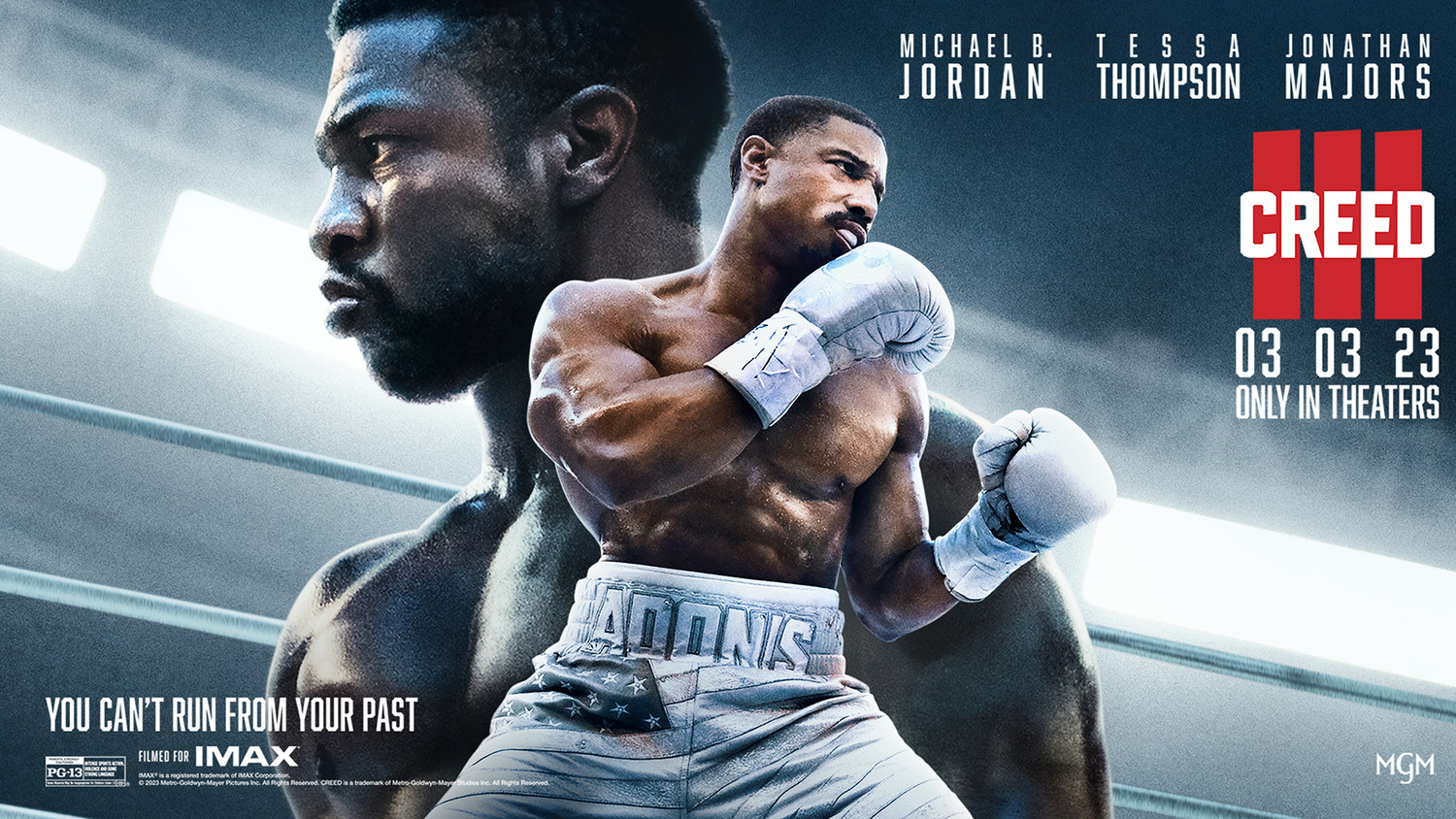CREED III Review: Third Entry in the Series Might Just Be the Best
Michael B. Jordan directs and stars alongside Tessa Thompson and Jonathan Majors in the boxing drama, opening in movie theaters everywhere.

Michael B. Jordan’s directorial debut, Creed III, the third legacy sequel/spin-off and ninth overall entry in the decades-old Rocky franchise, finds the title character, Adonis “Donnie” Creed (Jordan), the onetime heavyweight champion turned business impressario and name brand, professionally and personally successful beyond his wildest dreams. He's figuratively, if not literally, on top of the world.
Creed has all the power, prestige, and privilege that accompanies his status as a member of his sport’s boxing elite. As Creed ambles out of his namesake training gym, however, he becomes upset at the presence of a man dressed in shapeless, off-the-rack pants and a hoodie leaning on Creed’s ultra-expensive car. Creed predictably, even understandably, responds with frustration, impatience, and indignation toward the other man and his imposition on Creed’s valuable property and invaluable time.
Success — and everything that accompanies success — has colored Creed’s worldview in the intervening years since we last saw him onscreen, triumphing over Viktor Drago (Florian Munteanu), the son of his late father’s last foe, Ivan Drago (Dolph Lundgren). The blind spots Creed has developed in the intervening years aren’t intentional, but they’ll impede the title character as he attempts to reckon with the unexpected consequences of his success, including the regret, remorse, and guilt associated with Damian Anderson (Jonathan Majors), the childhood friend newly emerged from an 18-year-stretch in state prison. Inevitably, Creed and Anderson will face each other in the one and only arena that ever really matters in the Rocky/Creed series, the boxing ring.
After not one, but two back-to-back prologues, one set two decades ago, the other three years ago, Creed III finally settles more or less in the present day as Creed enjoys his semi-retirement, awakening at no particular hour to play with his preteen daughter, Amara (Mila Davis-Kent), or exchange pleasantries with his songwriter-producer wife, Bianca (Tessa Thompson, sadly underused). Then he heads out to the renovated boxing gym that bears the Creed brand/logo for a meeting with the current heavyweight champion, Felix Chavez (Jose Benavidez), and Chavez’s stage mother-manager, Laura (Selenis Leyva), as he prepares to defend his title against Creed’s old foe, Viktor Drago (Florian Munteanu) in roughly four weeks.
Creed obviously enjoys playing kingmaker (“Don King without the hair” as someone later calls him) and the relatively easy, stress-free life he currently enjoys, but that ends once the aforementioned Anderson waits for him outside the gym.
In the first of several, increasingly tense scenes, Creed and Anderson warily exchange banalities. Anderson plays on Creed’s surface-deep guilt and remorse, first cadging a free meal out of Creed before angling his way into the gym and the position of sparring partner for Chavez as he prepares for the title fight against the younger Drago.
Anderson wants more, of course. Despite his advancing age, time away from the ring, and relative inexperience as a professional boxer, Anderson pushes for Creed to get him into the ring, preferably a high-profile, money-making fight on pay-per-view.
While Anderson plays — and preys — on Creed’s emotional vulnerability and desire to make amends for the life-choices, some on Creed’s part, some on Anderson’s, that sent them along two separate paths. Creed’s choices sent him onto a materially comfortable life as the adopted son of Apollo Creed’s wife, Mary-Anne (Phylicia Rashad), later as a boxing hopeful and champion. In stark contrast, Anderson’s life choices — one in particular involving Creed — forced him into a pitiless, unjust carceral system that treats young, impoverished Black men as incapable of rehabilitation or redemption and thus, disposable.
It’s a heavy, maybe too heavy an idea or theme for a mainstream blockbuster wannabe from a major studio, but it’s one that hovers on the margins or in the background, making Anderson, at least initially, into a deeply sympathetic figure, the hero in his own underdog story while Creed, the once root-worthy underdog turned millionaire champion, becomes an obstacle to Anderson’s painfully deferred dreams. Recognizing the potential audience split, Keenan Coogler and Zach Baylin’s script leans heavily on generating sympathy for Creed via his somewhat troubled home life: Bianca’s career switch due to her loss of hearing, Amara’s deafness and her combative behavior in elementary school, and Mary-Anne’s declining health. All three are meant to soften Creed, give him obstacles of his own, and to serve as a reminder of their — and our — fragility and eventual mortality.
Creed III, however, ensures those sympathies are fully back with Creed before the big, score-settling fight, turning Anderson from a potentially root-worthy character on his own into the tragic embodiment of toxic masculinity, choosing violence, in and maybe out of the ring, over the therapy he desperately needs. Anderson places the blame for his incarceration not on the criminal injustice system, but squarely on Creed for living the life Anderson believes he deserved.
Anderson's bitterness, anger, and resentment sets the onetime friends turned foes into a collision course in the ring. The inevitable third-act climax begins in a realistic outdoor setting (Dodgers Stadium in Los Angeles), before taking a turn into a surreal, anime-inspired finale, elevating the Creed-Anderson battle into near mythic status between godlike beings.
Jordan proves himself remarkably adept behind the camera, emphasizing a stylistic, energetic dynamism typical of Ryan Coogler’s stellar work on the eponymous first film. Mixing-and-matching different filmmaking techniques, from slow-motion, speed-ramping, and everything in between while keeping the camera tightly focused on the two leads as they employ distinctly different fighting styles, Jordan removes whatever doubts might have surfaced when news broke of the studio’s decision to give him the directorial reigns to the next entry in a profitable franchise. Though Majors gets the strongest arc along with some of the best lines in the film, Jordan adeptly elicits uniformly strong performances from the cast, regardless of their skill level, their age, or their relative experience.
That, in turn, makes the Creed series three for three quality-wise, a ratio any franchise, legacy or otherwise, would be hard pressed to duplicate. Whether the series ends here (unlikely) or continues on (more than likely), it’s certainly in good hands as long as Jordan and at least one of the Coogler brothers continues their involvement on both sides of the camera.
Creed III opens Friday, March 3, in movie theaters throughout North America, Latin America, Europe, Asia, Australia, and the Middle East.
Creed III
Director(s)
- Michael B. Jordan
Writer(s)
- Keenan Coogler
- Zach Baylin
- Ryan Coogler
Cast
- Michael B. Jordan
- Tessa Thompson
- Jonathan Majors









